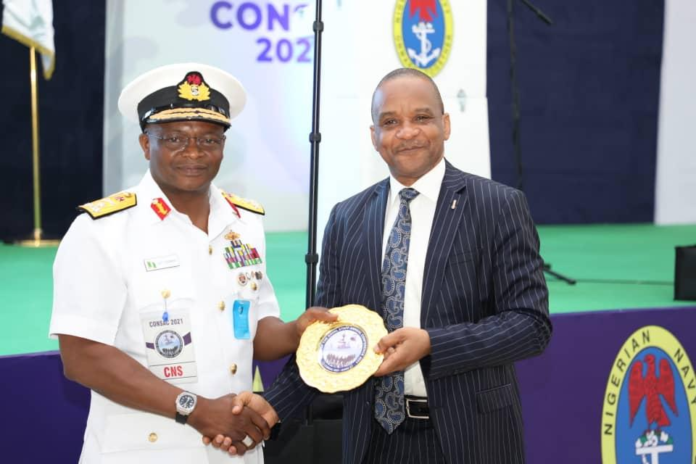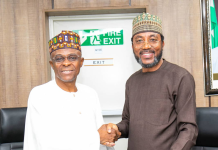
The Director-General of Nigerian Maritime Administration and Safety Agency (NIMASA), Dr. Bashir Jamoh has pointed the way out for the menace of maritime crimes in Nigeria’s territorial waters.
He also stressed need for what he called “enhanced stakeholder collaboration” in tackling maritime security challenges in the country and the Gulf of Guinea (GoG).
The NIMASA helmsman stated this in a paper presentation titled, “Enhancing Collaboration amongst Stakeholders for Improved Maritime Security in Nigeria,” at the just concluded Chief of the Naval Staff Annual Conference (CONSAC) in the Kano State capital, Kano.
Jamoh who was also honoured at the event by the Chief of the Naval Staff, Vice Admiral Awwal Zubairu Gambo for ensuring civil military cohesion also made references to the terrorist attacks of 9-11 the United States of America (USA) and the report of the 9-11 Commission indicting security agencies for failing to share real-time intelligence.
He enjoined Nigerian stakeholders to “learn to share their toys” in a bid to close the gaps and tighten the security ring around the nation’s maritime space against piracy and other maritime crimes.
He observed that despite the rich potentials of the maritime sector in the areas of job creation and revenue generation and its vital role in facilitating more than 90 per cent of world trade through shipping, the sector was undermined by maritime insecurity.
His words: “The economic cost of maritime insecurity is very pronounced for Nigeria compared to other countries. While the economic cost of piracy activity in Asia was estimated at $4.5 million (as at 2016), the estimated economic cost of maritime insecurity in the GoG was about $793.7 million.”
He identified sources through which insecurity led to loss of revenue in the maritime sector as ransom payment, insurance premiums, re-routing ships, security equipment, losses to oil and fishing industry, and cost of security escort.
According to him, studies have identified the following factors as the drivers of maritime insecurity in the region. They include an increase in ship traffic as a result of globalizsation; the debilitating leadership of many of the states in the region; the proliferation of small arms; poor monitoring and control of the oceans; and criminality, which have been further aggravated by visible youth unemployment.
He enumerated high level of poverty and economic hardship as some of the causative factors just as he pointed out that the impacts of these challenges are far-reaching and requires that all concerned should collaborate to tackle this menace.
Drawing examples from other climes, like the Regional Cooperation Agreement on combating Piracy and Armed Robbery against Ships in Asia (ReCAAP), Jamoh also stressed how stakeholders’ collaboration had been used to tackle maritime insecurity.
He identified the five clusters of Nigerian maritime collaboration as the Armed Forces/National Security Group (Army, Navy, Air Force, and so on); Non-Military Services (Customs, Police, Nigeria Immigration Service, National Drug Law Enforcement Agency and so on); agencies with incidental functions (NAFDAC, NNPC, DPR, and so on); regulatory agencies (NIMASA, NESREA, NOSDRA, NIWA and so on); and disaster management agencies (NEMA).
According to him, some collaborative efforts by NIMASA to address maritime insecurity include the implementation of the deep blue project; the enactment of the Suppression of Piracy and other Maritime Offences (SPOMO) Act 2019; community engagements; strengthening of the Navies of the GoG region; collaboration with chief executive officers (CEOs) of maritime industry organisations known as the Joint Maritime Industry Working Group (JMIWG); engagements with security forces (Nigerian Navy, Army, Airforce, Police, Customs, Immigration); and the Gulf of Guinea-Maritime Collaboration Forum/Shared Awareness and Deconfliction (GoG-MCF/SHADE).
He also stated that NIMASA was collaborating with the International Maritime Organisation (IMO), INTERPOL, regional organisations, shipping operators, as well as private security companies, submarine cable operators, and seafarers’ organisations.
The NIMASA helmsman called for the deployment of more resources for technical assistance to facilitate capacity building and expansion of automation systems for monitoring the maritime sector. He said this would enhance the country’s capacity for cooperation against trans-national maritime crime and terrorism with potentials to adopt a more participatory approach to maritime security.
“Working together is, therefore, a most vital approach to defend our seas, enhance maritime security, promote trade, protect the environment, and guarantee the quality of life of our people,” he added.










